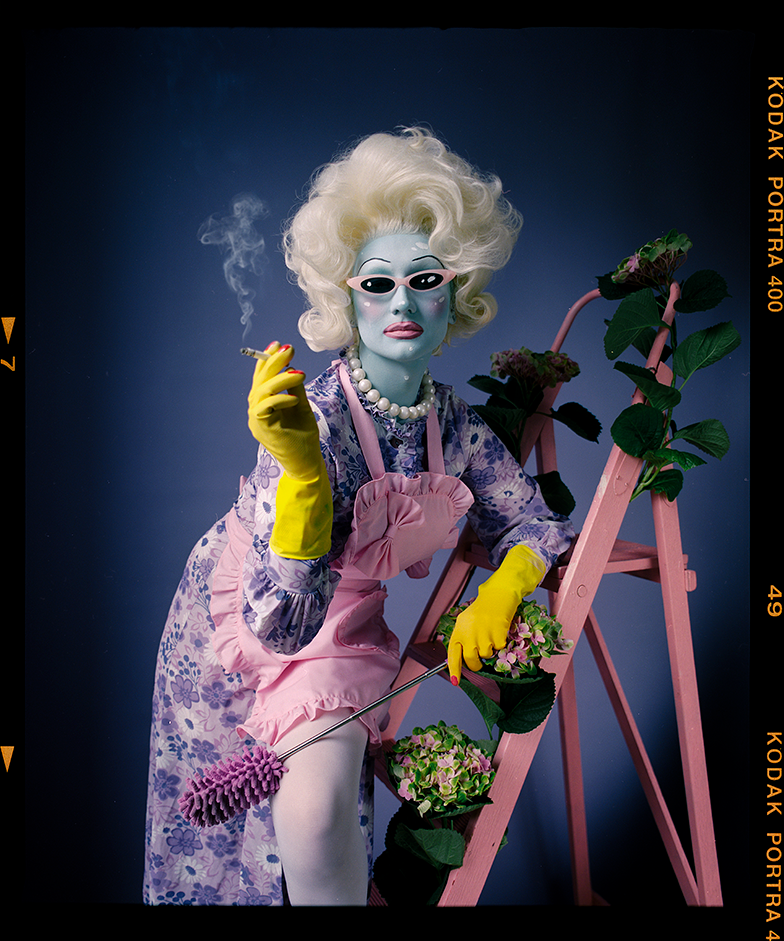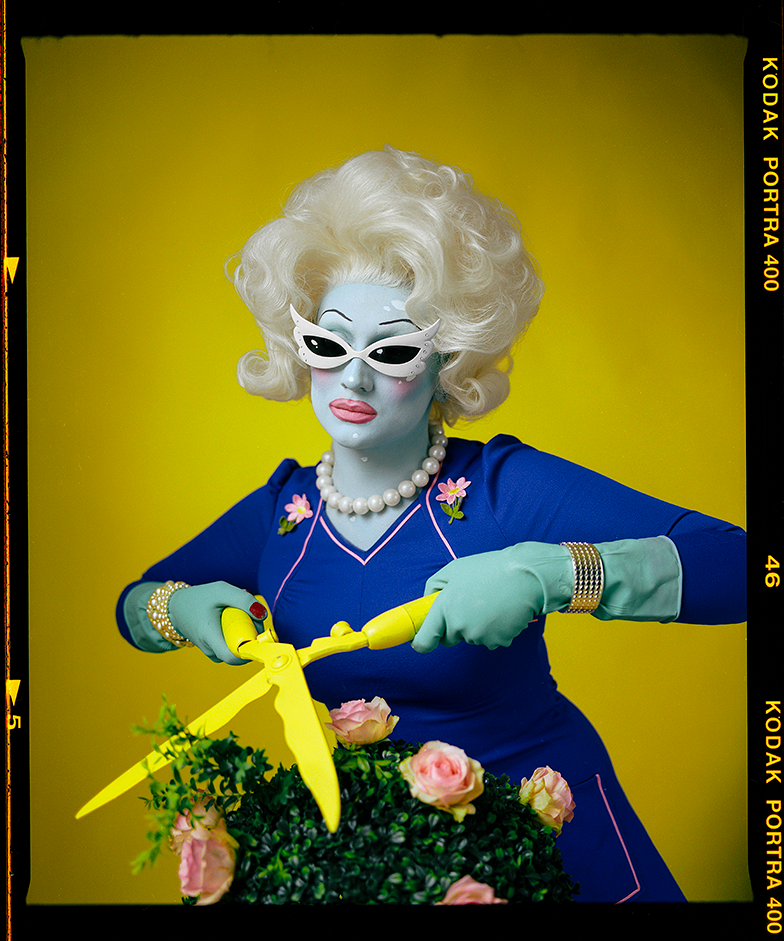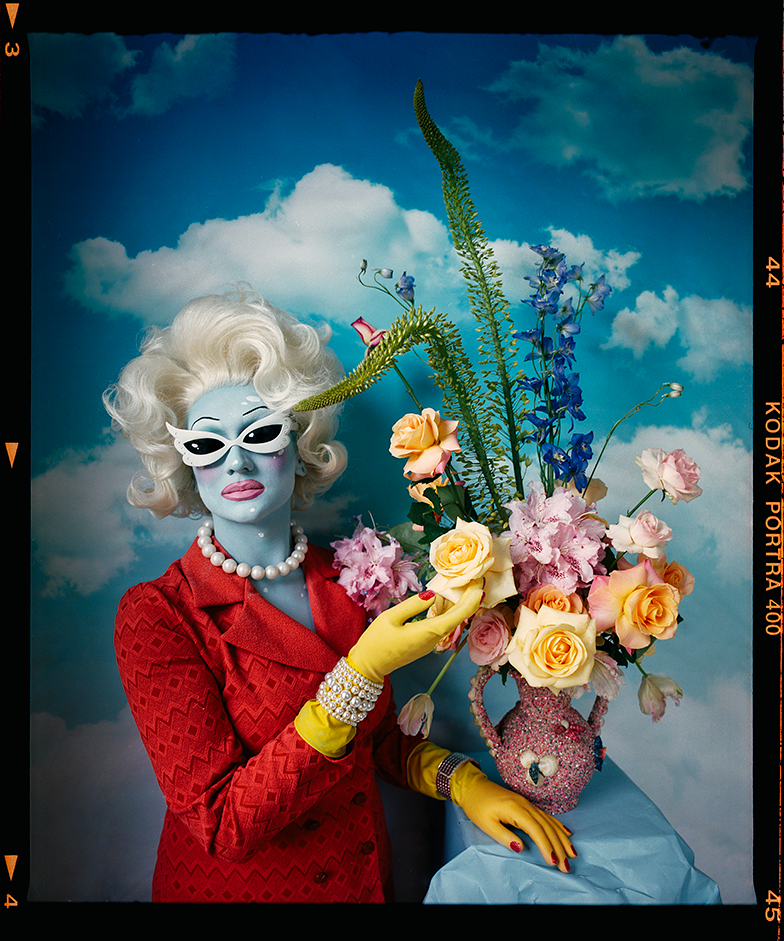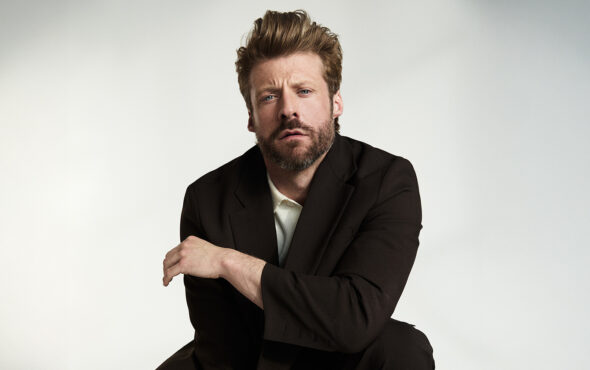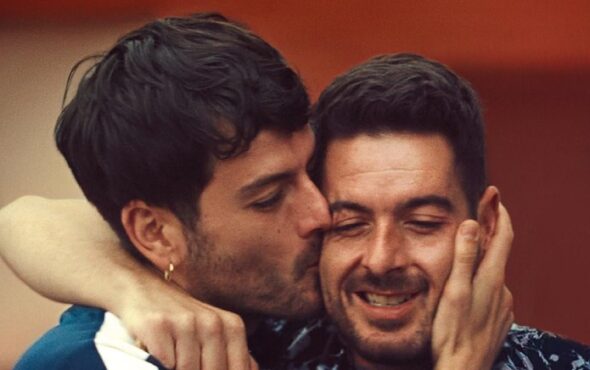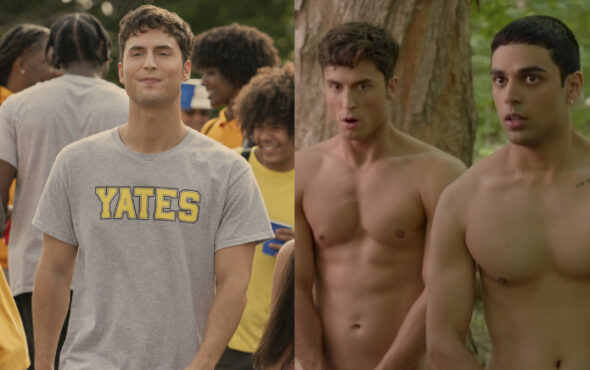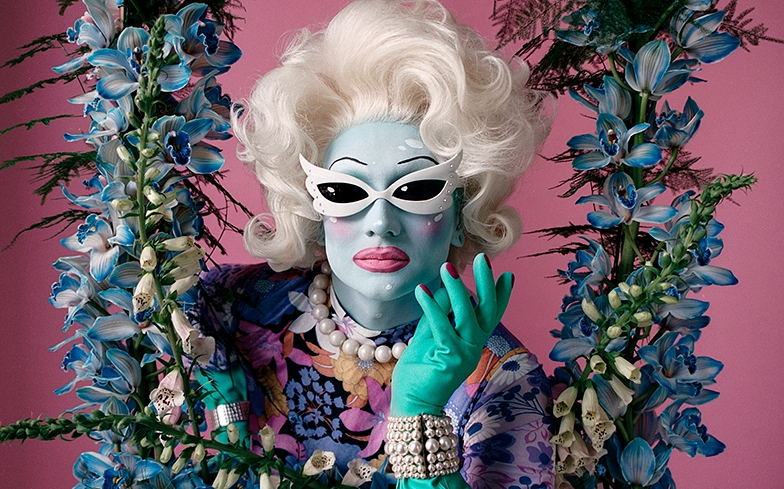
“My drag is very me when I’m having a ciggy and a nervous breakdown because I forgot to order my repeat subscription of hormones,” says Juno Birch.
“It’s kind of like watching The Muppets mixed with Mommy Dearest mixed with a really confused alien woman.”
The Manchester-born drag queen and futuristic sculptor has only practiced drag full-time since December last year, but she’s amassed a devoted following on social media due to her unique, Smurf-esque aesthetic and quirky sense of humour (she wants to start a video series where she walks around Sainsbury’s with a trolley, critiquing vegetables).
We spoke with the Sherri Ann Cabot of drag about how she became the proud trans woman she is today and why she’d “take the utter piss” on Drag Race UK.
How did you get into the world of drag?
I started early December and I started drag because I wanted to do it for so long, but was too scared. When I was younger, I stayed away from it and a lot of stuff to do with the LGBTQ community because I was constantly trying to be a biological woman. I was scared about people mistaking me for a man, so I was conscious about being part of that. When I got to a point in my transition, when I had no dysphoria anymore, I didn’t care what anyone thought of me. If somebody mistakes me for a man in drag, it literally doesn’t bother me anymore.
Your style of drag is very unique. How would you describe it?
My drag is very me when I’m having a ciggy and a nervous breakdown because I forgot to order my repeat subscription of hormones. It’s kind of like watching The Muppets mixed with Mommy Dearest mixed with a really confused alien woman. A lot of my drag performances are inspired by old movies, characters that are really fabulous and glamorous but extremely tragic at the same time, like Faye Dunaway in Mommy Dearest and Delia Deetz from Beetlejuice… Jennifer Coolidge in Best in Show. People like that. I love John Waters as well, he’s a big inspiration.
You create sculptures. How does this influence your drag?
When I’m making a sculpture, I want to be that character and create a story and then act it out on stage. I’ll create a sculpture, then I’ll have a character in mind and then I’ll be listening to really camp shit which will help me come up with an idea, a performance. I would love to do a one-woman show where I basically play all different characters that I’ve sculpted, because they’ve all got very different personalities.
Do you have a whole room of sculptures?
I did, but I have to pay me rent so I have to sell them. I don’t think I’ve ever owned more than four at once because I sell them. Performing is not a wage to rely on, it’s not a living wage, but doing sculptures is. I have to balance doing my art at home during the day and then preparing for performances in the evening.
Do you take days off?
Yeah, yeah, of course. But on my days off, I’ll feel guilty because I’ll just be sat there playing The Sims.
You’re a proud trans woman. When did you come to terms with your identity?
When I was about 13/14, I told one of the teachers in school that I felt like I was a girl trapped inside a boy’s body. I said it all the time when I was a toddler, ‘I want to be a girl, I want to be a girl,’ but people just thought I was a very camp child. When I hit puberty and I started to become a man, that’s when I started to realise that my body was going the wrong way. There wasn’t really much on the TV about being trans, and the only people that you would see on TV that were trans were people on Big Brother that were extremely flamboyant and crazy. I didn’t really relate to that at the time. Short time after that, I told my mum and my dad and because I was having quite a bad time, mentally, coping with the thought of growing up as a man, I was referred to a child clinic. They gave me leaflets about what trans is and it helped me identity that I was trans. It’s weird because so many trans people have different experiences; sometimes people are happy not going through hormone therapy or having surgery, it’s just identifying as a woman that helps them. For me, on the scale of dysphoria, it was the highest, I hated everything. The thought of sexually and physically being in a relationship with a man as a man was something that turned me off completely. I knew it wasn’t right for me.
How did you find the advice from your teacher and the clinic?
They didn’t really know anything, because in my high school it was the first time any student had ever identified as trans. They just didn’t know what to do. They tried to help me as much as they could with the counselling. There was even a time when – because I started identifying as Juno – I went from a very quiet boy to a very loud girl. My behaviour completely switched, so I was very, ‘I don’t care what anybody thinks, I’m just going to wear whatever I want to wear. The teachers can fuck off, I’ll do what I want.’ One of the headteachers told me at the time, ‘Juno, we’re happy for you to do what you want to do, but we advise you don’t come in in a skirt, and don’t dress this way because it feels like you’ll be bullied more.’ I came in the next day in a skirt. It was like a scene out of Mean Girls, strutting through the yard in a skirt. It was the same at prom as well, I showed up in a 1950s halterneck, polka dot prom dress and everyone was like, ‘Oh my God.’
What were the attitudes from your fellow students like?
I got bullied a lot, but I developed this bubble. I went through a lot, but I was never ‘poor me’. I just felt so lucky that I could do what I wanted to do, it felt so liberating and free, so I didn’t really care. I was insecure, very insecure, about being an ‘artificial’ woman, but I just didn’t care anymore. All the lads that would bully me in early school days gradually understood what was going on with me, and by the end of year 11, I was really good friends with a lot of the football lot. They understood that I didn’t give a shit, and I think I kind of educated them in a way. It’s like Pete Burns, he got so much shit in the early 2000s because of the way he looked, but when people realised he did not give a shit, they loved him.
You transitioned quite young. How was it for you?
Really up and down. When I transitioned as a kid, I thought, ‘I just want to be a biological woman. I don’t want to be trans. I’m a woman.’ I didn’t want anything to do with the LGBTQ community. If you had spoken to me back then, I would’ve sounded different because I used to squeeze my voice so it was higher and stand in a really girly way, dress girly and constantly try to pass. When I went through my transition and had hormone therapy and reassignment surgery, I got so comfortable with the way my body was, I no longer tried to pass. I realised trans is beautiful, and being an alien is beautiful. Being trans was an insecurity, and now it’s something I’m really proud of. I’m glad that I’m trans because it’s what makes people beautiful.
It’s often debated that children shouldn’t be allowed to go through gender assignment surgery. What are your thoughts now that you’ve lived that experience?
When I was younger, it was either, I had that surgery, or I would just die. I couldn’t live my life with male genitalia. So back then, I was very, ‘I should be able to have it now.’ Now that I’ve been through that, it’s such a mentally straining process and it’s such a shock when you have the surgery. I’ve never had any doubts whatsoever that I wanted to have that surgery, but when I woke up the next day, I was like, ‘Oh my God, what have I done?’ It’s like losing an arm in a way. You have to slowly adapt to it, even though it’s what you feel your body should be like. So now, my opinion on it… The waiting list is very long, so no children are really going to have that surgery. When you go through transition, you spend so many years evaluating your psychological state. At 16 I started hormone therapy, so I think that’s an okay age to start.
What advice would you have for trans youth who are struggling with their identity?
It gets better. It really does. I remember thinking back to when I was a kid and I couldn’t imagine my future at all, because transitioning seems so far away and you see where you want to go and where you want to get to. It comes a lot quicker than you think. That dysphoria goes away, and for different trans people it goes away at different points in their transition. When it goes away, you feel so free. An older lady trans lady gave me some advice before I had my surgery, she said, ‘You spend your whole life waiting for that moment to have surgery and when you’ve finally had it done, it’s almost like, what am I here for now?’ My advice would be: don’t put your life on hold.
People say trans women shouldn’t participate in drag. Have you ever experienced this ignorant opinion?
Not directly. There’s a lot more support now for trans women who do drag. The thing is, trans women started drag. It’s weird for people to say and what makes people say that is RuPaul’s Drag Race. Even though I love Drag Race, they only cast men, so the younger generation is watching that thinking, ‘That is what a drag queen is.’
Do you think Drag Race will start accepting all corners of the LGBTQ community?
I think so. I don’t know. I feel like more and more people are starting to not watch Drag Race, especially the drag community. I feel like there’s going to be more and more television to do with drag, so Drag Race won’t be the only thing on TV.
Would you ever be tempted to audition for Drag Race UK?
Not at the moment because I am so bad at sewing. I cannot make clothes at all. I feel like if I went on it, it would just be a comedy because I wouldn’t be able to dance, I wouldn’t take it seriously, I’d go on to take the utter piss because that’s more fun to watch. Possibly in the future, but definitely not at the moment because I don’t feel like I’m as experienced in the drag community, and there’s more room for people who have been working in the industry for a lot longer than me. Usually the people who have been working in the industry for many years are the best people to put on Drag Race because they’re the old, campy, bitchy queens who stir up drama and don’t give a fuck what people think of them. That’s what I love to watch.
What can we expect from Juno Birch in the next few years, apart from the fifth or sixth season of Drag Race UK?
I don’t have a clue to be honest. I never plan anything in advance, so I never know what I’m doing. I don’t sit at home with a plan of, ‘On Tuesday I’m going to do this…’ The only thing I do have planned is that I’m going to LA in September, and I’ve never been out of Europe so I’m really excited to crash my UFO over there. I also want to start videos, going round with a trolley in Sainsbury’s, picking up vegetables and things, like, ‘What is this?’ I think I’m doing that on Wednesday.
Photography Eivind Hansen
Floristry Yan Skates
